 |
| Adventure, March 15, 1928 |
Inspired by a post on the True Pulp Fiction blog:
A beautiful cover from D. Cammerrota, an artist about whom i could find almost nothing beyond the fact that he? (The first name D is spelled Dominic, Dominice, Dominick in different places) graduated from the Philadelphia School of Art in 1923.
Interior illustrations are by John R. Neill, the illustrator of many Oz stories.
I’m posting the headings and first few lines of the stories with ratings and brief reviews.
Lost Legions · Malcolm Wheeler-Nicholson · ss 2/5
Russia was in chaos, and in Siberia the brains of the American, British and Japanese detachments were playing a subtle game of strategy…
|
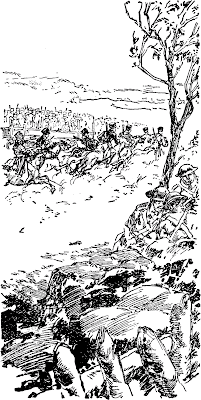 |
Far up ahead there was a burst of music. One could hear the differently keyed bugles of many nations sounding a variety of shrill notes. It was almost time for the big parade of the Allied forces to start through Vladivostok. Davies glanced back to where his battalion stood at rest, the men laughing and talking so that the neighborhood was filled with the hum of their cheerful, careless voices. They looked very staunch in their businesslike khaki. If only there were more of them! For, after all, this one regiment of American infantry was lost among the hordes of Oriental warriors that filled Siberia.
Suddenly above the sound of the men’s laughing and chaffing he heard a queer, high pitched, continued note. Gazing curiously up the street, he saw a group of men from the British cruiser in the harbor marching into the main way from a side road.
At their head was a lone sailor, a huge, beef fed Britisher, tootling away merrily on a miniature set of bagpipes. The contrast between the bulk and seriousness of the man and the wierd tootling he emitted was startling to eyes unaccustomed to the sight. Already the nearest Americans were’ beginning to chuckle. Knowing the American doughboys’ propensity for loud and irreverent mirth, Major Davies turned sharply.
“Batta-a-a-l-ion! Atten-n-n-shun!” he sang through his cupped hands.
There was an instant rattle and clatter as the men sprang to their places and into immobility, followed by a silence that was broken only by the droning, high pitched notes of the British bagpipes. There was the stolid rise and fall of the boots of the British sailors who marched to its tune.
The title of this story comes from the poem Gentlemen Rankers by Rudyard Kipling. The story itself is set during the American Expeditionary Force in Siberia (1918-1920). The author had been a part of this expedition himself, and clearly knows what he’s talking about, the story is rich in detail. There is no plot to speak of, just a series of incidents – some funny, some tragic.
Here’s one of them:
A company of American soldiers is tasked with guarding a bunch of German prisoners of war. The kind hearted sergeant in charge of the POWs finds out that the prisoners have not eaten for two days, and the entire company shares their rations with the POWs. Other POWs, seeing this, sneak into the camp, increasing the number of POWs so that eventually, the guards have to change their mission to keep POWs from breaking in rather than out…
The bad thing about this story is not the lack of plot, though that does make it hard work to get through, it’s the strong racist overtones.
Overtime · Frank Richardson Pierce · ss 2/5
When eternal darkness came to the keeper of the light…
Twilight was fading. Slowly, even reluctantly fading. Warning men to prepare for darkness. And thus was fading the twilight of John Law’s vision. Alone in his lighthouse tower Old John was preparing.
The first warning, a blurring of objects like the sea smothering a reef, had filled him with horror. It was not the horror of eternal darkness. A lighthouse keeper’s battle with darkness never ceases. It was the fear of being removed from the lamp he had watched over nearly fifty years; fear of being sent to the greater darkness of a peopled world—a world where human beings created in the image and likeness of God did not speak to one another, though all were alike and shoulder brushed shoulder in passing.
Fear of removal swept him like a wave, smashed him as a breaking sea smashes wreckage and left him a drifting derelict, He stood with gnarled hands gripping an iron rail and saw fog, though he knew no fog drifted off the cape today. The wind, unbroken in its thousands of miles of sweep, split against the concrete tower. It swayed him like a tree with broken roots.
“No!” he snarled. “They won’t take me from here!”
He rubbed his eyes and dimly made out the exact spot from which to leap. A falling body would not be shattered and broken against the rocks, for here the sea would surge up with open arms to receive its own. It would hold its own forever. In his broken condition he poised, then he remembered his light. In nearly fifty years no light in John Law’s keeping had failed. He remembered that few men had seen him, but countless thousands had caught the friendly gleam of his light. They said, “Old John’s light never fails!” Greater tribute than the pinning of a be-ribboned medal on the breast.
No, the light could not fail, even though his own was flickering and would die. He…
An old lighthouse keeper, a solitary hermit on a small rocky island off shore, is losing his sight and afraid of being taken away from his job when the captain of the boat that supplies him comes to meet him.
Texas Man [Part 4 of 5] · William MacLeod Raine · sl 1/5
A powerful novel of early Arizona…
THE Quinn brothers, Whip and Russ, dictated the law in the town of Tough Nut; and when Boone Sibley, rugged son of Texas pioneers, thrashed their right hand man, Curt French, in a fair fight, they decided Boone was dangerous to their interests. They advised him to leave town. He stayed.
Soon afterward, the Bisbee stage was held up and the driver killed. The Quinns spread the report that the two men who did it looked very much like Boone Sibley and his friend, Dusty Rhodes; they induced the sheriff to post a reward of three thousand dollars for Boone, five hundred for Rhodes. The reward for Boone read “dead or alive.” They knew the lawless element would prefer to take a fighter like Boone dead.
Boone and Dusty rode to Galeyville to clear themselves. They were attacked by a crowd intent on claiming the reward. Dusty was wounded; Boone was besieged in a store where he had fortified himself. Night came on, and capture seemed imminent, when Tilatha McLennon, a girl he had recently saved from Mexican vaqueros, climbed over some roof tops, reached Boone unseen, and directed him to where she had a horse waiting. Boone, in Mexican sombrero and serape, made his escape to Tough Nut.
He had little trouble convincing Tom Turley, owner of the paper, the Gold Pocket, that he was innocent. The sheriff was called in and Boone gave himself up, presenting an alibi: Dusty and he had been far from the scene of the holdup, and had run into two old prospectors who could verify this statement. They were found, and verify it they did. Boone was released. Turley published an account of the exoneration in his paper.
Infuriated, the Quinns charged him with trying to shield an outlaw, and incited a mob to run the editor out of town. Mobeetie Bill, a fine old ex-Confederate soldier and filibuster, who was at the Turley home at the time, quickly put out the lamp, told the editor and his niece to remain quiet, and went to an open window to address the crowd. Curt French was leading them, and he roared:
“Don’t argue with me, you old fool. I’m cornin’ to drag him out immediate!” And then without a word, Eve Turly, the editor’s niece, slipped into the hall and stepped out into the moonlight, standing slim and white, like an apparition, alone before the angry mob.
CHAPTER XXIV
MOBEETIE BILL DRAWS A BLACK BEAN
THE EFFECT of Eve’s sudden appearance, of her broken appeal, was startling. The wild frontier always respected good women. They were as safe as though they were in God’s pocket. The worst outlaw, if there was any hint of manhood in him, would go far to aid and succor any of them in need. This girl’s youth, her charming helplessness, an air of innocence enhanced by her simple white dress touched by the magic of moonlight, all reached them as though they had been well calculated stage devices.
Even Curt French was taken aback. He glared sullenly at her, while his slow brain groped with the problem. A bully and ruffian, a killer never deterred by moral distinctions as to fair play, his impulse was to crush her and push on to his purpose. But he knew that would not do. Vaguely he was aware that the men behind him were sentimentalizing the situation. She was not just a fool girl to them; she was for the moment the embodiment of an ideal they had been cherishing in their hearts through the sodden years.
“Now Missie, you-all better run along somewheres. We ’low to have a li’l talk with yore uncle,” he wheedled. “Jes’ a li’l talk about business, y’understand.”
“No—no!” Her refusal went past him to the men behind. It was as though she knew that she might win them but not their leader. “You won’t do him any harm, will you? If you understood—if you knew how good he is—”
“We know he’s backin’ up this killer Sibley,” some one flung back.
“But he just asked you to wait, not to make up your minds too soon. I’m only a girl. I don’t know anything about it.” Her voice broke in a little wail. “But I know my uncle is good—and—and you mustn’t hurt him.”
“This yere is a he-man town,” another man growled. “We don’t aim to let him run it like a kid’s school, an’ then renig when he feels like it.”
“Cripes, no!” French flung out an oath. “Nor he cain’t hide behind a woman’s skirt. Outa the way, girl. We won’t hurt you none, but we aim to get Turley.”
He took two steps forward, then stopped. Some one had come around the comer of the building, vaulted lightly to the porch and was standing beside Eve.
The killer’s jaw dropped. Never in his turbulent life had he met such a surprise as this. The man who had joined the girl was Boone Sibley.
It was a murmur to begin with, the sound that swept the crowd, then as the name passed from one to another it became a roar. Before the harsh menace of it Eve shrank back, appalled. But not the Texan. He faced the rising storm of rage silently, eyes undaunted, poised figure motionless. He made no gesture toward a weapon.
The house door opened. Mobeetie Bill came out, caught Eve by the shoulders, whirled her body and pushed her into the passage. He grinned at Boone.
“Looks like a pleasant time was gonna be had by all,” he drawled.
Normally I wouldn’t review this because this is not the first part of the serial. Make your own judgment on the writing based on the sample.
Of a New Life [Luigi Caradosso] · F. R. Buckley · ss 2.5/5
A ruthless nobleman who once so far forgot himself as to do a noble deed…
TO Andrea the Blond, called a pastry cook in the service of his Grace the Duke of Venieto at his palace in the capital, these:
Young man—
BE NOT alarmed that a stranger should write to thee thus, which is to say, at some length; nor that the said stranger, whose name may not be entirely unfamiliar to thee, should display knowledge of thy true function in the household of his Grace.
I have just parted from one Roberto Falducci, an old campaigner friend come to visit me in my retirement; who boasted (not knowing to whom he spoke) of having first disobliged his Highness, and then of having met thee in a dark street and come away with his life. Nay, more; he said that, had he not been drunk and accordingly full of the Christian virtues he would certes have come away with thine; since, having missed thy first stroke, thou didst incontinently drop thy dagger when he turned on thee, and pleaded for mercy on the ground that thou wert about to marry and begin a new life.
My son, my son, what is this? For I may explain, now as well as later, that thou art my son; at least according to what I was told. My name (to save thee turning pages, and thus losing the thread of this paternal exhortation) is Luigi Caradosso; I was formerly captain of the guard to a Duke of Venieto; and if thou art indeed the young man I have in mind, thy mother hath a mole on the left side of her neck, about two fingers-breadths below the ear. It is a regret that her name escapes me, save that it began with M; a sensible woman, with no gullet for lies, on whose account I am the more astonied at thy behavior, Andrea.
Circumstances have given thee a trade; thou art a bravo. It might be wished, in theory and by those with no need for thy services and no care for thy welfare, that thou wert a priest; but in fact thou art not, and it is with facts that we must deal.
And the fact (at least as related by Roberto) would seem to be that, a sinner by trade, thou art endeavoring to improve thyself by becoming virtuous! Alas! Even had thou not calf-bawled thine intention to marry, I should have seen the form of Woman in this madness of thine; no man ever went so mad without feminine aid. And, perceiving the said form, I know that against it neither my fatherly authority, which I now exert for the first time in my life, nor my seventy…
The Caradosso story by F.R Buckley would usually be reason enough to buy this issue. Machiavellian mischief in medieval Italy is fun, and I’ve always been a sucker for stories told in epistolary form.
This story starts well, with Caradosso the mercenary finding himself a captain in the employ of an evil lord who thinks nothing of killing a friend to get some money. The lord raids a neighboring castle and carries off the daughter of the knight. On finding out that his lieutenant and the girl are in love with each other, the lord has a once in a lifetime moment of kindness. He marries the couple and sets them free. But, as they say, no good deed…
I felt the story was too predictable.
Bug Eye Gets Hisself in Jale [Bug Eye] · Alan LeMay · ss 1/5
Letters of a wandering partner…
Hen Crick,
August 1878.
DEER BUG EYE,
This is to let you noe Bug Eye that you are even worse off than I thot you was, O you jest wate till i lay hands on you.
Yoo had no rite to get impashunt Bug Eye jest becaus I was delaid a munth or 2 with the grub, I explaned to you in my letters jest wy I was delaid and if you did not get all of my letters it is not my fault I can not help it if very few fellers ride over tord Elk Mowntin to take letters.
I reelize that you didunt hav any spoon vittels or salt or such wen I left to go after grub Bug Eye but you had severil rounds of powder left, plenty to last you fer sum time if you was prudent and did not waste any shootin animels of small size. An anybuddy of your age an strength shoud of got along all rite even if I did not get back with the flowr an stuff as soon as I expected.
In short you was perfeckly all rite on Elk Mowntin Bug Eye an didunt hav no excuse to brake yer werd an leeve camp jest becaus I was delaid. I hav figgered out Bug Eye that I coudent hav ben gone morn 6 wks wen you puled up stakes and left camp, and heer I hav ben toilin an laberin an swettin to bring you grub to a plase ware you hav not ben fer upwerds of a munth an I am very…
Dialect, like chocolate jam, is best applied as a thin layer. Otherwise it’s too rich for my taste. The dialect was so thick in this one that I didn’t get past the first two paragraphs.
A counterexample from Avram Davidson for you.
A Show for the Romans · Charles Tenney Jackson · ss
Two pugilists in a prison camp…
THE COWBOY Congressman from the Third District and the captain of the State road camp watched the file of dusty men in gray stripes coming from the barbed wire bullpen to climb up along the foot of the towering canon wall beyond the cottonwoods which marked the bed of the Altemas River. Deveny, the kidding young gang guard, had stopped the fifth prisoner in the line and drawn him aside.
“So that big hulk is Mike Gannon?” grinned Cowboy Bob. “Cap, your intentions are good, but I fear for this fight show you’re planning for the Senator. That gorilla’ll murder College Kelly.”
“Not with Butch in the ring with ’em,” said Captain Jenkins. “We promised a parole to the winner, and Kelly’s due for it. The job now is to haze Gorilla Gannon into fightin’ at all. I told Deveny to get the mob workin’ on him. Run him ragged, make him sore—rub it into him about that Juarez fight. You remember? Eleven years ago when them two went thirty-one rounds till a Mexican chief o’ police stopped it.”
“It must have been bad if a greaser chief stopped it,” murmured Congressman Phelps, “and it broke Kelly’s fighting heart, didn’t it? He was coming on, the fastest heavy in the lot. Smashed him—”
“He’s got his chance for revenge,”…
A sports story. Yikes.
The Poisoner · Raymond S. Spears · ss 3/5
Pied Piper of the Coyote Country…
Trinidad Sharon sat on a tall sorrel horse looking down at a baby whiteface calf, or rather the remains of one. At a little distance a cow stood, lowing, her neck distended as she mourned her first born. A young cow, she had been inexperienced in caring for the newborn creature; and two coyotes had come by on their long circuit and discovered the easy meat. While one coyote had tricked the mother, the other had worried the calf to death.
Sharon owned the Broken Bottle Brand. He easily read in the loose ground most of the details of the tragedy before him. He would have sworn, had there been any one to listen; but he was alone. Coyotes exasperated him. This pair in particular had annoyed him now for about three years.
He got down to examine certain details.
Pieces of the skin of the calf were pulled into long shreds. Where the beasts of prey had wrangled with the tender skin, he did not fail to note that there were long gouges in the flesh side, where the jaws of both animals had closed upon the hide.
“Cummers,” he grumbled, “ain’t got a good tooth in their heads. Had to claw into it with their paw nails and poke through the hide with their noses. Worriers! Huh!”
Sharon thus read the exact facts. Then he turned around to ride oft in another direction without a look at the fool cow—as he thought—who hadn’t known how to save her calf as an older one would have been able to do. He didn’t feel sorry for her; the calf would have been worth twenty-five dollars to him, about three years hence, depending on the market.
Coyotes vs. Ranchers. That’s how this story starts and I expected it to end unhappily for the coyotes and happily for the ranchers. But Spears took the story in an unexpected direction…
Conquest · William Corcoran · ss 2.5/5
The story of a farm lad who hungered for the range trails
ONCE it had been called “the town at the edge of nowhere.” Rolling prairie surrounded it, receding to lost distances on the horizon. Sparse parched grass covered the land, dusty and drab. Through the empty skies the wind blew, hour upon hour, day after day. And over the vast country lay two thin lines of steel, side by side, gleaming in the sun, heading straight for the town—the railroad that gave it birth.
A stranger might wonder what in all this land persuaded the community at Two Forks to endure its bleakness; what, indeed, enabled them to keep body and soul together. The dusty streets, the warped plank sidewalks, the rows of unpainted houses, gray with the premature age of the prairie country, looked much as one would expect to find their inhabitants, poor and ill nourished.
Yet the unlovely place teemed with life, blatant, coarse and lusty. Two Forks— the town at the edge of nowhere.
The phrase, if he ever heard it, did not occur to Zeke Bennett as he stared at the little town from the railroad station. The daily westbound from which he had alighted was puffing its clangorous way once more toward the setting sun; a faded carpet bag was at his feet; he had arrived. He saw, strangely enough, romance in the ugliness of Twin Forks. He saw on the endless bleak prairie, with a vision that was most practical, an empire yet to come. In young Zeke was the blood of pioneers.
Zeke’s fellow travelers were making their way in more prosaic fashion toward the hotels and restaurants of Twin Forks, and he picked up his carpet bag and followed. As he walked along the main street there was a shining light of contentment in his eyes and his nostrils were full of the soft pungency of the prairie in the cooling day. He was an attractive youth; his gaze was frank and blue and his mouth was strong. He was not very tall, but there was a rugged muscularity to his body. The strength in his wrists and hands suggested to a knowing eye the miles of true deep furrows he had trod in the wake of a heavy plow.
Only two buildings in town were distinguished by an honest and unmistakable second story. Many of the stores and saloons were imposing with high false fronts, but the Grand Union Hotel and the Golden Hour Saloon were actual two story buildings, the latter with an outside stairway leading to the long room above…
A farm boy in search of adventure and romance gets both.
Prayer · Noel Stearn · pm
Poem
Double Exposure · Edward L. McKenna · ss 2.5/5
The problem of a newspaper cameraman…
EVER hear the one about the old friends who met on Park Row and one of them said—
“Charlie, what are you doing now?” Charlie burst into tears and answered: “I—oh, Jim, Fm a reporter for the Evening and Morning Tabloid, but I ask you, Jim, don’t tell mother. She thinks I’m playing the piano in a dive over on Eighth Avenue.”
It may very well be that one of the tabloid fellows himself started it going around, and it’s not to be taken too seriously. They’re much like any other outfit, except maybe they have to work faster and get their stuff over quicker. They have to depend more on the news and less on essays than, say for example, the Westminster Gazette does.
Anyhow, Joe Hawkes was a photographer for the New York Daily Picture Bulletin—not exactly a reporter, though he did do some Sunday feature stuff. He liked the syndicate stories and always was nosing around for them. Somewhat literary in his tastes, at that, he was always carrying around a volume of the Modern Library in his pocket—Norman Douglas, or Sudermann, or Dostoyefsky.
“I’m nuts about this guy Dostoyefsky,” he told one of his friends in the composing room, who suffered from similar afflictions. “He’s got the right idea. He thinks the world is a madhouse. So it is.”
He had gradually worked up to this pinnacle of sophistication. His first professional study was published in Saint Nicholas…
The writing is good, but the plot is very light.
Jungle Jewels · Tom Curry · ss 4/5
A tale of Venezuela and black gold…
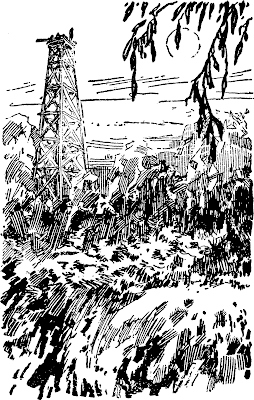 |
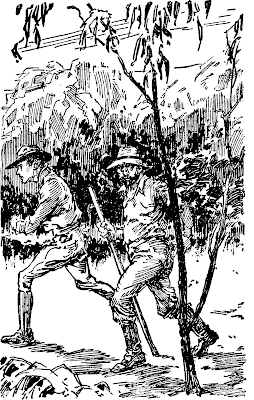 |
THE BOAT beached in the mud, and the big man in the bow stepped past the peon paddler and climbed the bank. Behind him came another, a tall young fellow in tropical clothes and a cork helmet.
Both were engineers, the advance guard of the oil men of the Maracaibo fields.
The older man, in the lead, had a four day stubble; his assistant had shaved not more than two days before, the tropical fever not yet having entered his blood.
It was an emergency expedition. There were six boats, all handled by small Venezuelans, peons, and several Americans. But Barclay, the big engineer, was in charge. He was an hour ahead of the second boat.
‘Thank God it’s all over,” he growled, He gazed about him at the terrible destruction. Fire had been here, fire which had seared and roared in the mighty jungle. For a half mile square every living bush and tree had been exposed to the terrific heat of an oil fire.
“Holy mackerel! It was some bonfire,” exclaimed Thomas, the assistant.
They had come prepared to fight fire. It did not disappoint them to find that the holocaust had burned itself out.
The spot was many miles from Lake Maracaibo, the center of the oil basin. Rumors of an immense fire had come to the offices of the company. Barclay had been sent out at once; for damages done by the company would have to be made good.
Barclay walked into the white ashes. The fire had burned down to the river edge. On the side of the water it had been held, but it had spread well into the forest. It would have gone much…
Tom Curry’s debut story saves this issue. A great noir story of an oil driller obsessed with driving a well, his woman, and a couple of his subordinates who find diamonds near the well. The subordinates want the well to fail so that everyone will lose interest in the place, and they can get their diamonds. Add to this their resentment of the driller for having a woman when they have none, and for bossing them around – and the mixture is explosive, awaiting ignition.
A gripping read and you can almost see the movie in your head.
Terror Land · Hugh Pendexter · ss 2.5/5
A novelette of the days when the Apache Smoke still menaced the Southwest Towns…
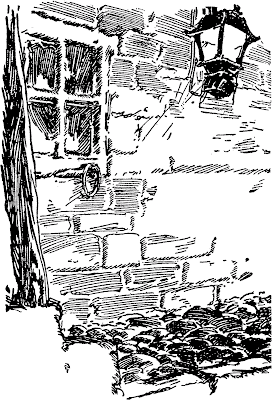 |
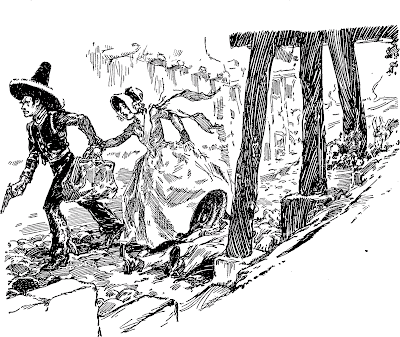 |
CHAPTER I
THE CASTAWAYS
FOR DAYS the Apache smokes had climbed into the perfect Arizona sky on all sides of the collection of mud boxes called Tucson. On mesa and peak hidden watchers talked beneath somber pencilings across the blue heavens. Like so many gray black noxious weeds the smoke rose from ten thousand foot levels in the far background, from various heights within a few miles of the town.
From day to day Tucson men watched the smoke tendrils shrewdly, speculatively, and found them so many smudgy fingers writing terrible invitations and fearful urgings. They decided it would be unsafe to wander any distance from the adobe huts, and then they turned back to the monte tables, the mescal shops, or took their siestas and otherwise carried on the circumscribed lives of castaways.
The young American, known as Yuba, finished his breakfast and wandered to the ruined plaza to read the signs anew before making wagers for, or against, the arrival of the Butterfield Mail Company’s eastbound stagecoach. He found the smokes very thick. From the purple peaks of the Pinaleno, from the Sierra Mogollon towering over the Tonto Basin, from the pine covered Santa Catalina range, the young man saw the smokes crawling upward. And he was quick to pick out new smokes against the southern horizon, down Tubac way, where already the road was lined with graves of recent victims.
There was no question that the Apaches were out in many small bands, killing and burning, with their warfare extending as…
The year is 1861. The place is Tucson, Arizona. The frontier settlement is a refuge of lawless men who gamble and drink the day away. Apache raids happen daily. A Mexican bandit leader terrorizes the town, and even the lawless men gathered there fear him.
Into this scene comes a pretty girl from Tennessee, the daughter of an archaeologist who is exploring the Arizona territory. The wolves gather for a feast, but there is one man who is between them and her. Will they survive? Read this story and find out. I liked the background of the story but felt the ending was pretty weak. It could have been better if it had been longer. Perhaps then the threads of the plot could have been tied together better.
By the way, is it just me or does that image remind you of The Wizard of Oz?
Ask Adventure · Anon. · qa
The Camp-Fire · [The Readers] · lc
WELL KNOWN in other publications, Mr. Curry presents in this issue his first Adventure short story, “Jungle Jewels.” And, according to custom, he rises to introduce himself.
I started out to be a chemical engineer, and held to that course for three years. In the summers I traveled here and there.
But writing I fancied beyond the laboratory; I dropped the test tube for the typewriter.
I have visited the tropics, and been here and there, recording and remembering. I know rotary drilling. Maracaibo intrigues me. There it is, the great lake, one hundred and forty miles long, sixteen million acres of jungle and water in all, under which lie mighty reservoirs of oil.
In these Maracaibo yarns I have a silent partner, a man who drilled there and knows the terrific grind of the great race for oil. He contributes much technical advice, and some description.
I intended adventuring in the semi-tropics this winter, again; but a house out here, set in the Connecticut hills, was impossible to resist. I bought it, and cancelled my passage. Hence, this winter I will be shivering in snow, instead of sweating in the tropical sun, by the sea. But there will be other winters.—Tom Curry.
The Trail Ahead · Anon. · cl


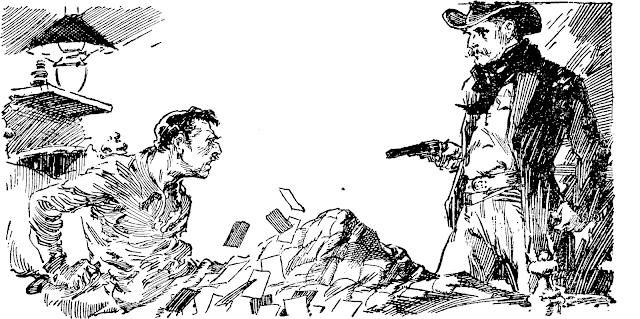
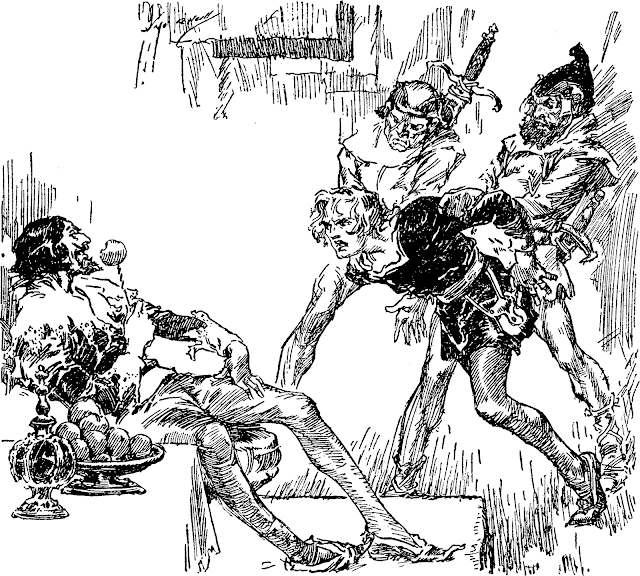
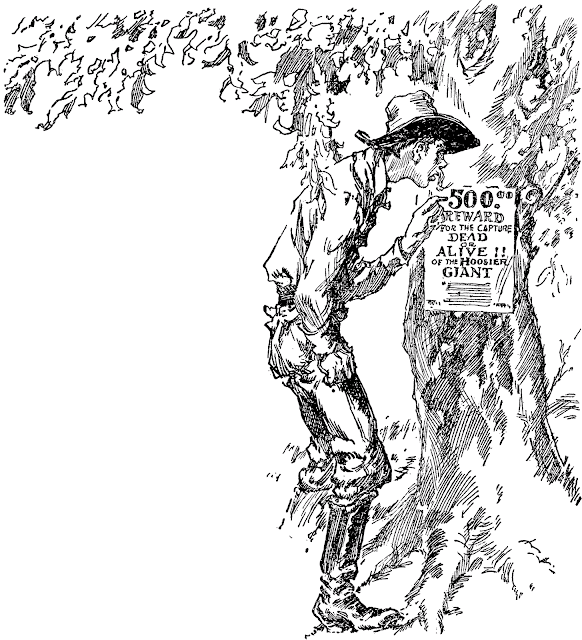
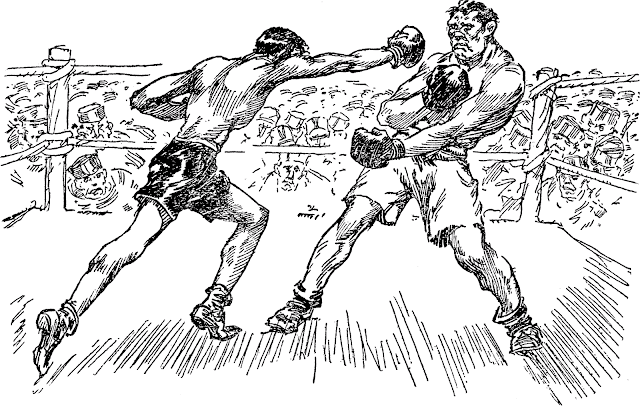
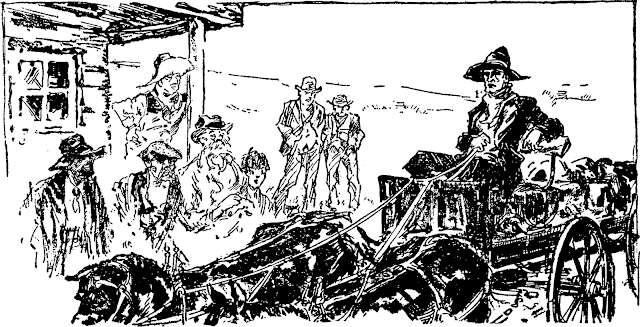


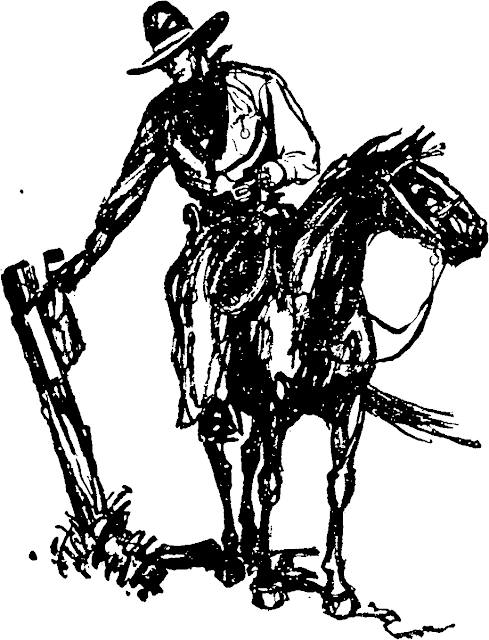
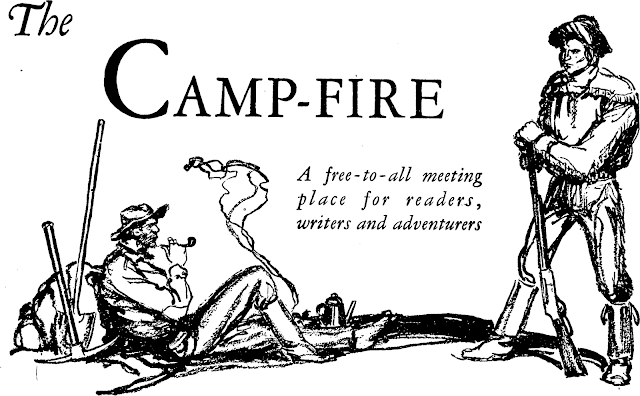
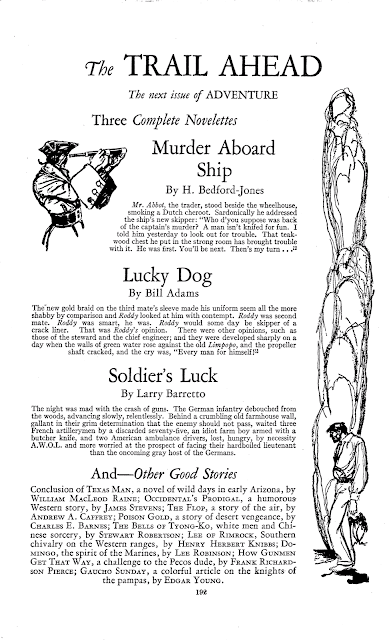
These surveys are great, Sai. Appreciate the info on Tom Curry, whose Argosy stories available at unz.org are pretty good. I feel the same as you about dialect stories and was disappointed to see LeMay doing such stuff. Hope to see more issue reviews like this on your site and mine.
As time permits, so do I. Reading is easy, takes me a couple of hours, but writing them up and making a blog post out of it takes me half a day or more.
Thanks for the inspirations. Keep them coming.
I also enjoy these reviews. The only story I've read in this issue is the Raine serial which I thought was mediocre. I guess I skipped the other stories because they did not look that good.
The Raine serial was terrible – badly written Victorian melodrama in a western setting.
But you should read the Tom Curry story – I had come across a few of his stories earlier, and they were well written, but nothing like this. This is a great noir movie that never got made with Robert Mitchum or Robert Ryan as the obsessed oil-driller.